How to Protect Your Written Ideas and Stories — Maybe you’ve just finished your best piece yet or struck gold with a story concept, but you’re concerned about someone taking it. It’s natural to feel protective of your writing, especially when you’re starting out and eager to safeguard your creativity. While outright theft of your work word-for-word is rare, there are important steps you can take to understand your rights, register your copyright, and make sure your work stays protected.
Part1 Understanding Your Rights to Your Stories and Ideas

1. You cannot copyright an idea.
Under Section 102(b) of the U.S. Copyright Act, “copyright protection does not extend to any idea, procedure, process, system, method of operation, concept, principle, or discovery.” This means the law does not allow you to copyright an idea or concept. While you may attempt to file an “idea misappropriation” claim if you believe your concept has been stolen, such cases are notoriously difficult to prove in court. ¹ ²
It’s also worth remembering that even if you share your idea, the odds of someone executing it exactly the way you would are extremely low. For this reason, don’t be afraid to discuss your ideas with trusted friends, collaborators, or writing partners. Protecting ideas is legally impossible, but protecting stories is both possible and far more valuable. ³
🔎 Key Point: Ideas cannot be copyrighted—focus on protecting your expression instead.
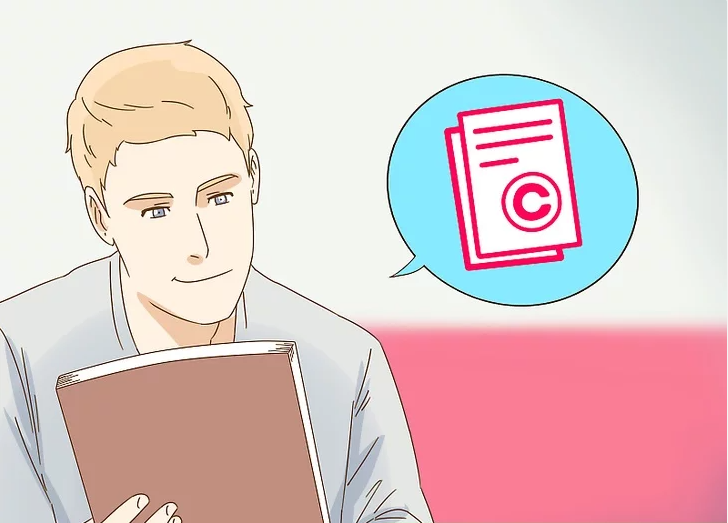
2. Know what you can protect in your written work.
The moment your story is written down—whether on paper or digitally—it is automatically copyrighted, even if unpublished and without a copyright symbol. Still, it is highly recommended to register your work with official bodies such as the Writers Guild of America or the U.S. Copyright Office to strengthen your legal standing in case of disputes. ⁴
Copyright law protects the execution of your idea, not the idea itself. This includes short stories, scripts, novel drafts, or treatments. If you ever face a copyright dispute, you must prove that you created your work first and that another person’s work is substantially similar. Official registration, along with saved drafts, emails, and dated notes, serves as critical evidence of ownership.
🛡 Key Point: You can protect your story execution through copyright, not the raw idea.
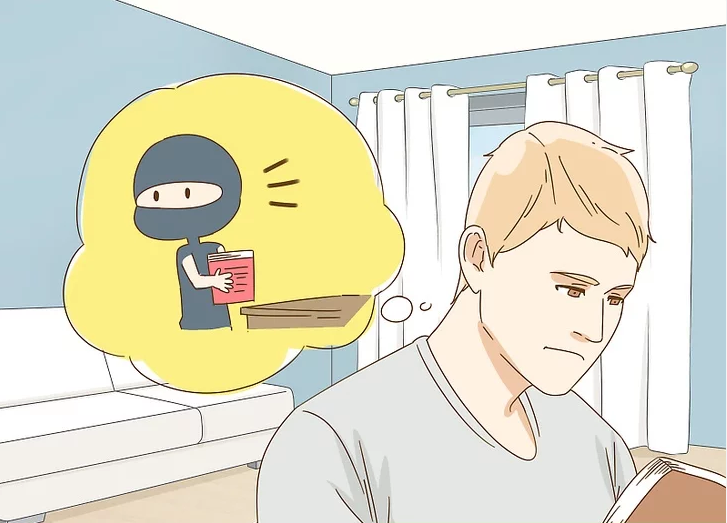
3. The risk of unpublished work being stolen is very small.
For someone to steal your unpublished writing and profit from it, they would need to obtain a copy, polish it, pitch it to an editor or producer, and actually sell it—an unlikely and risky process. At some point, the plagiarism would likely be discovered, and the legal and reputational consequences would outweigh any potential gain. ⁵
It’s important to keep perspective: theft of unpublished work is rare, and most writers view the risks of being caught as far greater than the rewards of stealing someone else’s words. This means your best strategy is not fear, but proactive protection through documentation and copyright registration.
📖 Key Point: Stolen unpublished work is rare—focus on creating and safeguarding, not fearing theft.
Part2 Copyrighting Your Work
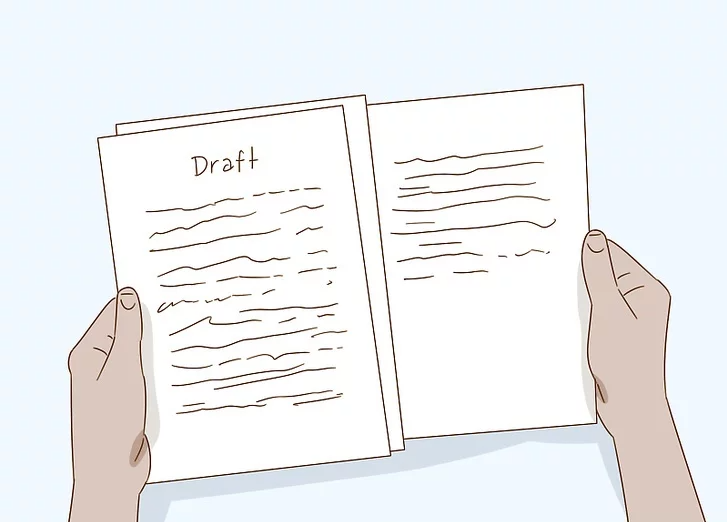
1. Gather written evidence of your work.
One of the strongest ways to protect your writing is to create a clear paper trail proving ownership. This includes saving a novel outline, script treatment, and all draft versions of your story in one organized place. ¹
You can store everything in a computer folder (with password protection and backups) or in a physical binder. As you continue developing your work, keep adding new drafts and notes. This archive will serve as vital proof of authorship if disputes ever arise.
🗂 Key Point: A well-documented archive can serve as proof of your rights.
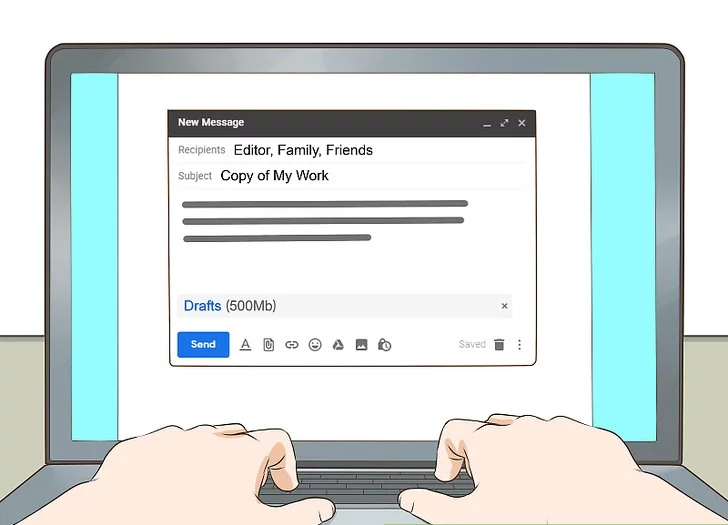
2. Send evidence to a trusted friend or colleague.
Even if you maintain your own archive, it’s wise to send copies of your work via email or mail to someone you trust. In case of a legal dispute, this person could act as a credible witness and verify that you were the original creator. ²
This person might be your writing partner, editor, publisher, or a reliable friend/family member. Choose someone responsible who is likely to preserve the documents long-term.
🤝 Key Point: A trusted witness strengthens your credibility in disputes.

3. Archive emails and related documents.
Keep a record of all emails, drafts, and discussions relating to your work. Save any files you send or receive that involve your manuscript or script. ³
You should also log in-person meetings or conversations about your writing. A clear record of who had access to your drafts helps protect against false claims of authorship.
📧 Key Point: Detailed email/document archives prove ownership and access history.
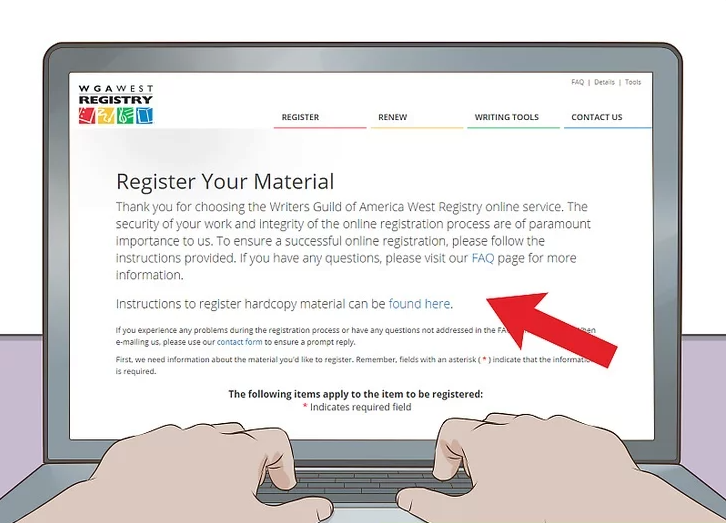
4. Register your work with the Writers Guild of America (WGA).
If you’re working on a script, registering it with the Writers Guild of America provides a public record of authorship. ⁴
- WGA West (Los Angeles) and WGA East (New York) both offer registration services.
- Fees: $10 for members, $20 for non-members (WGA West), and $22 for non-members (WGA East).
- You can register online or by mailing in a title page, an unbound copy of your script, and the fee.
🎬 Key Point: WGA registration is a cost-effective way to protect scripts.

5. Apply for a copyright with the U.S. Copyright Office.
The most legally binding protection for your work comes from registering it with the U.S. Copyright Office. This official registration strengthens your ability to enforce your rights in court. ⁵
The process can be completed online or via mail. As of the latest update, the filing fee is $30 for standard registration. ⁶
🛡 Key Point: U.S. Copyright registration provides the strongest legal protection.
Part3 Protecting Your Work in Other Ways

1. Place a copyright notice on your work.
If you want an extra layer of visible protection, you can add a copyright notice at the top corner of your document. The standard format is:
Copyright © 20XX by [Your Name]. ¹
That said, many professional editors and publishers consider this unnecessary, even amateurish, because your work is automatically protected under copyright law once written. Still, if it gives you peace of mind, you can include it for personal reassurance.
🖊 Key Point: A copyright notice is optional—your work is already legally protected once fixed in writing.

2. Submit your work only to reputable editors and publishers.
One of the most effective safeguards is to work only with credible publishing professionals. Avoid editors or publishers who pressure you to sign away rights too quickly or who operate in low-quality markets (such as predatory self-publishers or vanity presses). ²
Reputable publishers and editors won’t risk their reputation or face costly lawsuits by stealing work. In fact, most major publishing houses are cautious about rights management and prefer to avoid disputes altogether.
📚 Key Point: Protect your work by partnering only with established, trustworthy publishers.

3. Consult an intellectual property attorney if theft is suspected.
If you believe your story has been stolen, seek advice from an intellectual property (IP) attorney. A qualified lawyer can help you establish proof of ownership, explore legal remedies, and, if necessary, represent you in court. ³
It’s also wise to involve an attorney when negotiating publishing or representation agreements. Having legal guidance ensures you don’t unknowingly sign away key rights and that you receive fair terms for your work. ⁴